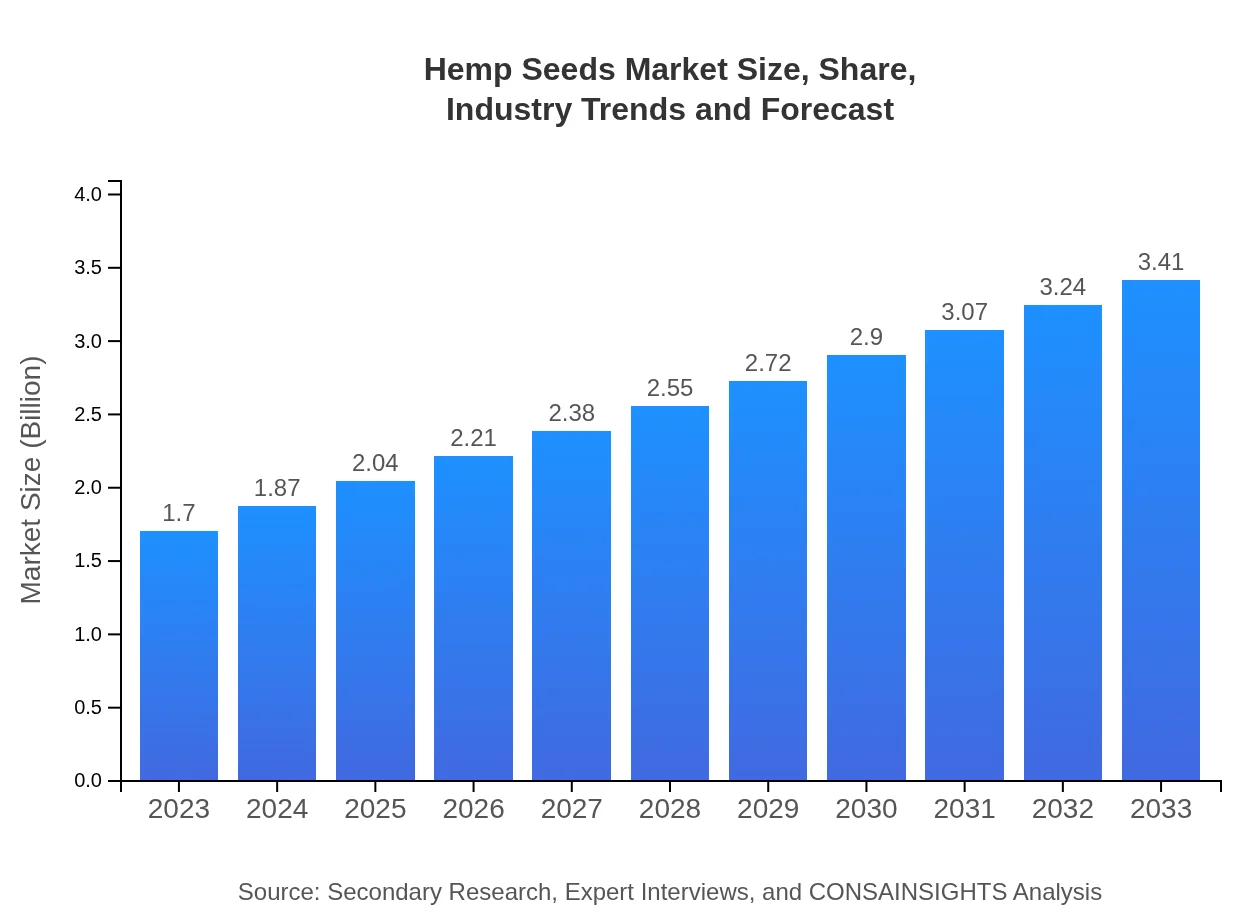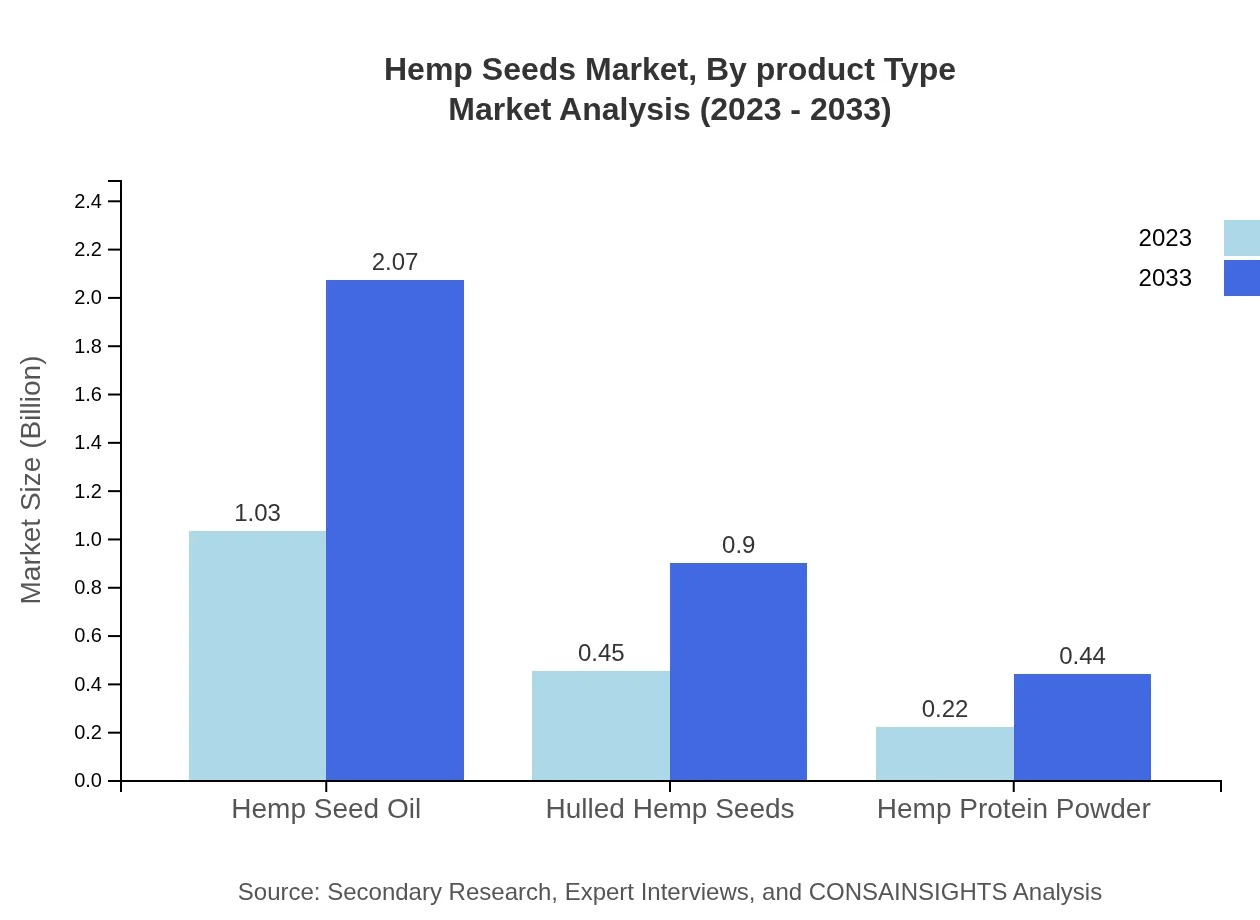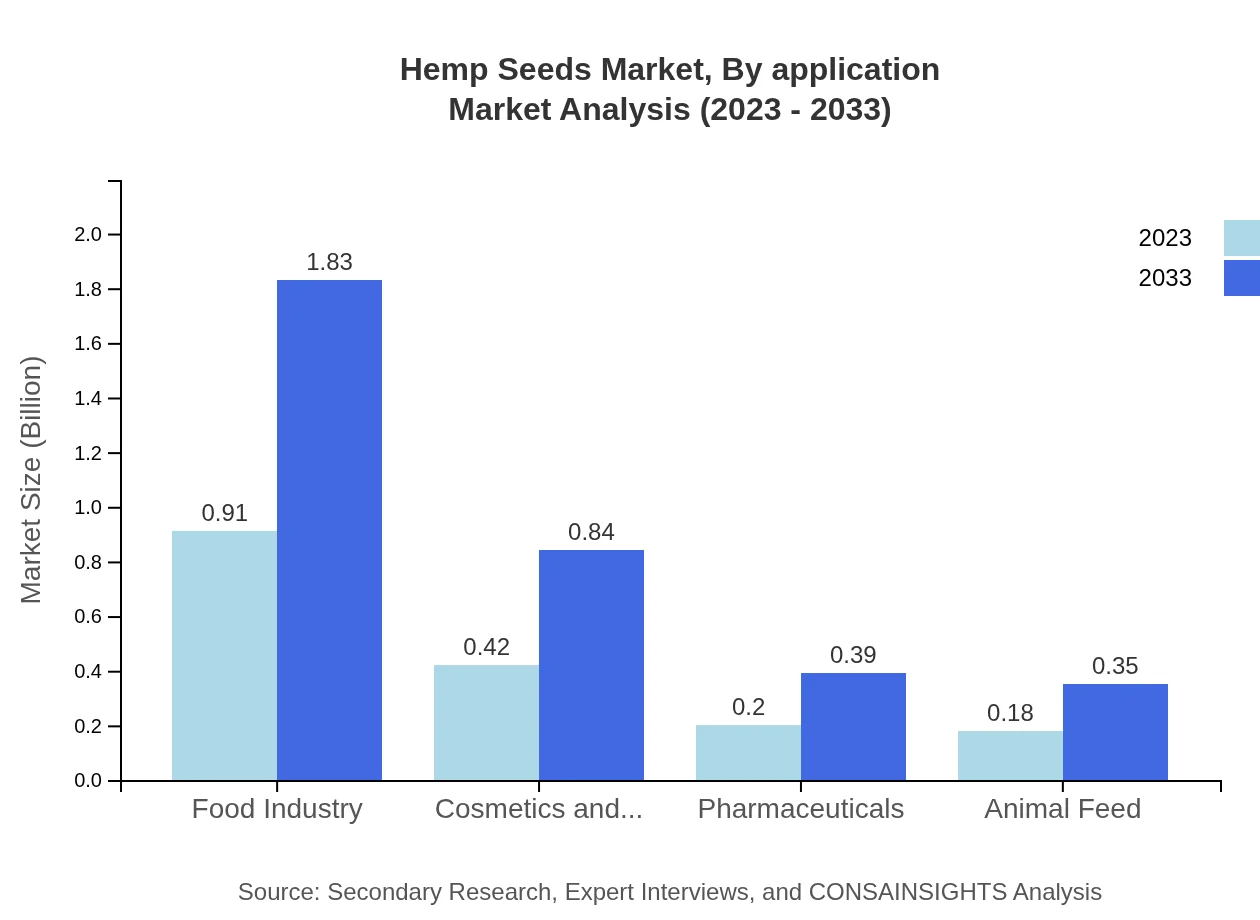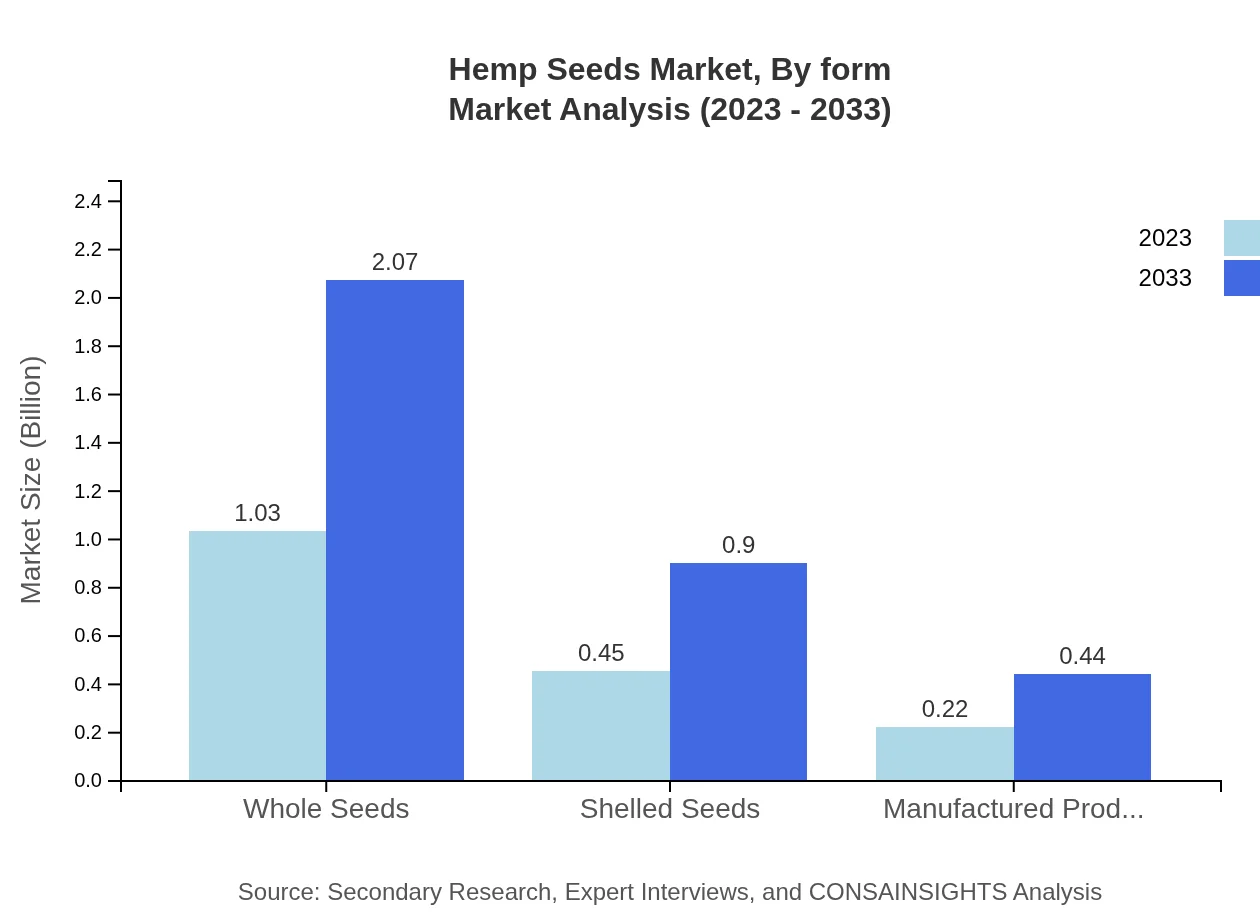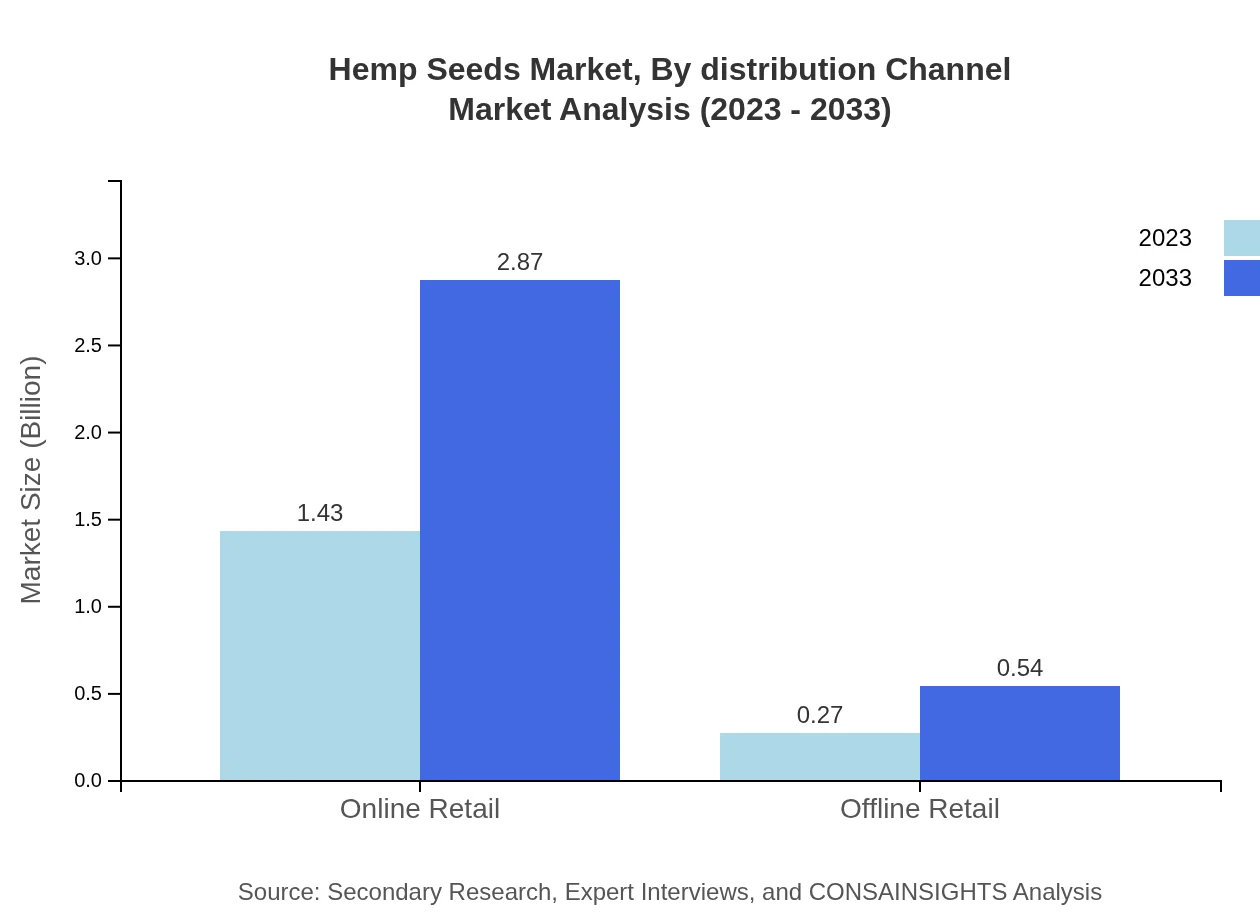Hemp Seeds Market Report
Published Date: 02 February 2026 | Report Code: hemp-seeds
Hemp Seeds Market Size, Share, Industry Trends and Forecast to 2033
This report explores the Hemp Seeds market, providing insights on market size, industry trends, segmentation, and regional analysis from 2023 to 2033.
| Metric | Value |
|---|---|
| Study Period | 2023 - 2033 |
| 2023 Market Size | $1.70 Billion |
| CAGR (2023-2033) | 7.0% |
| 2033 Market Size | $3.41 Billion |
| Top Companies | Manitoba Harvest, Hemp Foods Australia, Nutiva |
| Last Modified Date | 02 February 2026 |
Hemp Seeds Market Overview
Customize Hemp Seeds Market Report market research report
- ✔ Get in-depth analysis of Hemp Seeds market size, growth, and forecasts.
- ✔ Understand Hemp Seeds's regional dynamics and industry-specific trends.
- ✔ Identify potential applications, end-user demand, and growth segments in Hemp Seeds
What is the Market Size & CAGR of Hemp Seeds market in 2023?
Hemp Seeds Industry Analysis
Hemp Seeds Market Segmentation and Scope
Tell us your focus area and get a customized research report.
Hemp Seeds Market Analysis Report by Region
Europe Hemp Seeds Market Report:
The European market is anticipated to double its value from $0.44 billion in 2023 to $0.88 billion by 2033. The EU’s favorable regulations and heightened awareness regarding organic products are propelling growth in hemp cultivation and consumption, especially within the health food segment.Asia Pacific Hemp Seeds Market Report:
The Asia Pacific region, with an estimated market size of $0.34 billion in 2023, is projected to grow to $0.68 billion by 2033, driven by increasing health trends and a growing acceptance of hemp-based food products in countries like China and Australia. The demand for nutritional supplements and organic food is surging, presenting lucrative opportunities for market growth.North America Hemp Seeds Market Report:
North America, particularly the United States, is a major player in the hemp seeds market with a size of $0.64 billion in 2023, expected to reach $1.29 billion by 2033. The legalization of hemp under the 2018 Farm Bill has spurred growth, with a significant increase in consumer acceptance and health-related product innovations specializing in hemp seeds.South America Hemp Seeds Market Report:
In South America, the market for hemp seeds is expected to grow from $0.06 billion in 2023 to $0.12 billion by 2033. Countries such as Brazil and Argentina are witnessing a rise in cultivation due to favorable climate conditions and growing interest in the health benefits of hemp seeds. Increasing local processing capacity could also contribute to market expansion.Middle East & Africa Hemp Seeds Market Report:
In the Middle East and Africa region, the market is projected to grow from $0.22 billion in 2023 to $0.44 billion by 2033. Increasing acceptance of hemp-derived products coupled with rising investments in agriculture technology are likely to drive market growth, as countries begin to explore the economic benefits of hemp cultivation.Tell us your focus area and get a customized research report.
Hemp Seeds Market Analysis By Product Type
The Hemp Seeds market by product type is dominated by Whole Seeds, which accounted for $1.03 billion in 2023 and is expected to reach $2.07 billion by 2033. Shelled Seeds comprise a market size of $0.45 billion in 2023, projected to double to $0.90 billion by 2033. Further, the manufacturing of value-added products like hemp oil and protein powder will contribute significantly to market diversification.
Hemp Seeds Market Analysis By Application
The Food Industry leads the market with a value of $0.91 billion in 2023, expanding to $1.83 billion by 2033. Cosmetics and personal care products follow, comprising $0.42 billion in 2023 and expected to grow to $0.84 billion by 2033. The pharmaceutical sector is also notable, with projections increasing from $0.20 billion to $0.39 billion during the same period.
Hemp Seeds Market Analysis By Form
The market forms a diverse landscape, with Hulled Hemp Seeds valued at $0.45 billion in 2023, slated to increase to $0.90 billion by 2033. Hemp Seed Oil is another critical contributor, growing from $1.03 billion to $2.07 billion, signifying the crucial role of diverse formats in enhancing product appeal and utility across consumer choices.
Hemp Seeds Market Analysis By Distribution Channel
Online Retail dominates the distribution landscape, with a market size of $1.43 billion in 2023 and projected to grow to $2.87 billion by 2033, accounting for 84.11% of market share. Offline retail experiences moderate growth, moving from $0.27 billion to $0.54 billion, highlighting a significant shift in purchasing behavior towards e-commerce platforms.
Hemp Seeds Market Trends and Future Forecast
Tell us your focus area and get a customized research report.
Global Market Leaders and Top Companies in Hemp Seeds Industry
Manitoba Harvest:
A leading hemp food manufacturer, Manitoba Harvest creates a wide range of hemp seed products, focusing on sustainability and nutritional benefits.Hemp Foods Australia:
Specializing in organic hemp products, Hemp Foods Australia ensures quality through sustainable sourcing and plays a significant role in promoting hemp seeds in health-conscious markets.Nutiva:
Nutiva offers diverse organic food products, including hemp seed oil and protein, with a commitment to regenerative agriculture and social responsibility.We're grateful to work with incredible clients.









FAQs
What is the market size of hemp Seeds?
The global hemp seeds market is valued at approximately $1.7 billion and is expected to grow at a CAGR of 7.0% from 2023 to 2033, indicating a robust growth trajectory.
What are the key market players or companies in the hemp Seeds industry?
Key players in the hemp seeds market include Manitoba Harvest, Hemp Foods Australia, and Nutiva, contributing significantly to market innovations and product developments.
What are the primary factors driving the growth in the hemp Seeds industry?
The growth is primarily driven by the rising demand for plant-based proteins, increasing awareness of the health benefits of hemp seeds, and expanding applications in food and personal care products.
Which region is the fastest Growing in the hemp Seeds market?
North America emerges as the fastest-growing region with a market size expected to increase from $0.64 billion in 2023 to $1.29 billion by 2033, fueled by increasing consumer demand and favorable regulations.
Does ConsaInsights provide customized market report data for the hemp Seeds industry?
Yes, ConsaInsights offers customized market report data tailored to specific needs within the hemp-seeds industry, allowing for a deeper analysis of niche markets and emerging trends.
What deliverables can I expect from this hemp Seeds market research project?
Expect comprehensive reports detailing market trends, segment analysis, competitive landscape, regional insights, and forecasts covering both quantitative and qualitative data.
What are the market trends of hemp Seeds?
Current trends include a shift towards organic hemp seed products, increasing online retail penetration, and a growing emphasis on sustainability in production practices.

